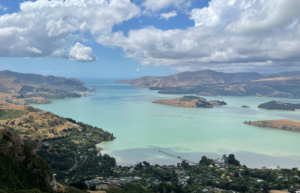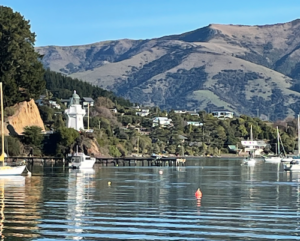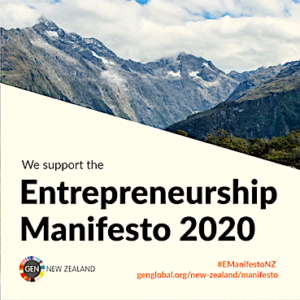
The 2023 election was supposed to be a climate election. Our last chance to set in place a paradigmatic shift in policies governing the way we treat our planet and thereby setting an example to other nations. Instead, the topic of environment has been almost entirely absent from debate. That says as much about voters as it does about the candidates vying for our attention of course. But we need to lift our heads and focus on the real opportunities, generating better outcomes for everyone, whilst avoiding setting fire to our own home.
Scrolling back through social media activity from the various political parties in the lead up to the election, it is clear that climate change and the environment are not at the forefront of political discourse. That is unsurprising given that polling has “cost of living” as the number one concern for voters. The difficulty is that inflationary cost pressures on households are largely outside of the control of any government whereas parliamentarians can influence how we treat the environment. Moreover, arguably less progressive nations are now surging ahead of us. It is not sufficient simply to state there is a “climate emergency”. Action is also required.
Most disappointing this election is that the New Zealand “Green” Party have ironically chosen to focus on almost everything EXCEPT the environment. Envy taxes, rent controls, income support. So having achieved very little for the environment alongside Labour, the current strategy now seems squarely aimed at eating Labour’s base. At the same time, Green policy is underwritten by divisive identity politics and other failed ideologies from the 20th Century aimed at producing dull, classless societies where thought and discourse is dictated by the State and elites in government control and distribute wealth, rather than individuals. They are completely missing the point.
In fact, what politicians across the spectrum all seem to be missing is our profound failure to meaningfully participate in the emerging global transition economy, a project worth more than US $100 Trilion over the next 25 years. It’s very simple. If we want to address social equity and care for an ageing population, we must generate greater economic wealth. Carbon transition alongside biodiversity regeneration will be one of the largest economic opportunities of our lifetime and good for the planet. Peering at our navels and invoking a victim mentality is not the kind of leadership needed right now.
A supporter of The Opportunities Party this election, Paul Spence is a commentator, researcher and serial entrepreneur, a previous co-founder of a successful New Zealand based global technology venture, co-founder and director of Creative Forest, principal at GeniusNet Research & SondXF and an advisor at ThincLab. You can follow Paul on Twitter @GeniusNet or sign up for a free weekly digest of startup, tech and innovation related events co-curated by him through New Zealand Startup Digest.


 The state government of Victoria has announced the first investments from a $2 billion fund for the commercialisation of research, science and technology. Breakthrough Victoria will focus on life sciences, agri-food, cleantech and digital technologies in a push to reboot the state’s post-Covid economy. The package includes $100 million for co-funding
The state government of Victoria has announced the first investments from a $2 billion fund for the commercialisation of research, science and technology. Breakthrough Victoria will focus on life sciences, agri-food, cleantech and digital technologies in a push to reboot the state’s post-Covid economy. The package includes $100 million for co-funding  This week I conducted a small experiment. I really want to play my part to reduce emissions, so I’m in the market for a plug-in hybrid electric vehicle (PHEV). I’ve also been doing a couple of papers at our local university for interest recently and have just completed a marketing course at Masters level. So I’m up to speed with marketing tactics and sneaky selling strategies. This is where the fun begins.
This week I conducted a small experiment. I really want to play my part to reduce emissions, so I’m in the market for a plug-in hybrid electric vehicle (PHEV). I’ve also been doing a couple of papers at our local university for interest recently and have just completed a marketing course at Masters level. So I’m up to speed with marketing tactics and sneaky selling strategies. This is where the fun begins. They called it the slap that reverberated around the world. A wealthy and privileged, angry man arrogantly displaying his lack of respect for a long established institution and the faithful community that had blindly supported him. No, I’m not referring to the infamous Oscars night incident, I’m talking about Grant Dalton’s acceptance of an offer from the city of Barcelona to host and fund the 2024 Americas Cup yacht race.
They called it the slap that reverberated around the world. A wealthy and privileged, angry man arrogantly displaying his lack of respect for a long established institution and the faithful community that had blindly supported him. No, I’m not referring to the infamous Oscars night incident, I’m talking about Grant Dalton’s acceptance of an offer from the city of Barcelona to host and fund the 2024 Americas Cup yacht race. I will defend to my last breathe the right for New Zealanders to peacefully protest about issues they feel strongly about. But the mob camped on the lawn in Wellington have now gone too far. It’s bad enough that they have obstructed a public road, shut down a bus station and university campus and harassed innocent passers-by. Now the Police have allowed a vigilante “security” force to impede access of citizens to Parliament grounds, a public venue that belongs to all of us. It’s no joke that the Police, Wellington City Council and the two Andy’s have failed the people of New Zealand.
I will defend to my last breathe the right for New Zealanders to peacefully protest about issues they feel strongly about. But the mob camped on the lawn in Wellington have now gone too far. It’s bad enough that they have obstructed a public road, shut down a bus station and university campus and harassed innocent passers-by. Now the Police have allowed a vigilante “security” force to impede access of citizens to Parliament grounds, a public venue that belongs to all of us. It’s no joke that the Police, Wellington City Council and the two Andy’s have failed the people of New Zealand. This year has been remarkable if for no other reason than the pandemic has resurfaced some ugly divisions that continue to bubble away behind the easy-going facade of New Zealand society. We are doubtless challenged now more than ever on numerous complex topics, including environment, poverty, crime, health, immigration and race. So the need for change is absolutely genuine. But the manner in which change is now being enacted is both contemptuous and potentially self-defeating.
This year has been remarkable if for no other reason than the pandemic has resurfaced some ugly divisions that continue to bubble away behind the easy-going facade of New Zealand society. We are doubtless challenged now more than ever on numerous complex topics, including environment, poverty, crime, health, immigration and race. So the need for change is absolutely genuine. But the manner in which change is now being enacted is both contemptuous and potentially self-defeating. During the last few months a number of us from the entrepreneur enabler community have been working on a
During the last few months a number of us from the entrepreneur enabler community have been working on a  Instructing the Super Fund to channel
Instructing the Super Fund to channel